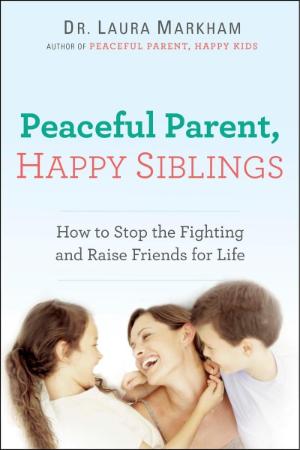
We want children to have practice navigating conflict. On the other hand, research shows that if we just "let them work it out" without guidance, the more powerful child wins, and we're reinforcing bullying behavior.
But there is a better way, one that teaches lessons your children will use to build healthy relationships for the rest of their lives. Here's your simple 4-step process to intervene in conflict so that you encourage communication -- with examples.
1. Decide whether to intervene.
- Watch to see if they need help. Often, if tempers aren't high, children can work out fair solutions.
- If they're struggling, take a deep breath to calm yourself before you intervene.
2. Empathize with each child as you describe what's happening.
- Say what you see happening, without judging or criticizing.
- Offer empathy to both children by stating their perspective. Say what you see them wanting in the situation, or why they're acting as they are (even if you don't agree with them.)
3. Coach the children to put their feelings into words.
- "It sounds like you're mad, and you have something important to tell your sister."
- "You can tell your brother what you need and want without attacking him. "
4. Support them to come up with solutions that work for both of them.
- Reinforce house rules as necessary without "blaming" either child: "Our house rule is no hitting, no matter what."
- Restate each child's position or need and acknowledge the impasse: "So you want X, and you want Y. We have two kids who both want to go first! What can we do to solve this?"
- Once children hear each other’s needs and feelings, they’re more able to come up with solutions that work for both of them.
How can you do this in the heat of the moment? Every day that you live with more than one child, you’ll have multiple opportunities to coach your children to identify and communicate their feelings. Just reframe these situations, so instead of responding with impatience, you remind yourself that every time your children are in conflict, it's a learning opportunity.
Of course, in daily practice, you'll find that you can keep this process much shorter and still facilitate peaceful conflict resolution. Let’s look at some examples.
***
Three year old James is playing with his garbage truck. Violet, 15 months, comes up behind him and tugs on the back of his shirt. James looks over his
shoulder in annoyance.
As he turns to shove her away, Mom says “James, Violet is tugging on your shirt. It looks like you don’t like that. Can you tell your sister in words? Pushing hurts.”
James: “No, Violet!”
Mom: “James, I hear you saying No! Can you tell Violet what you don’t want?”
James: “Don’t pull my shirt!”
Violet has been staring from Mom to James as they talk, eyes wide.
Mom: “Violet, James says don’t pull his shirt. Are you trying to get James’s attention? Do you want to play with him?”
Violet smiles and claps.
Mom: “James, do you see how much Violet wants to play with you? That’s why she was pulling your shirt; she was trying to tell you she wants to play. I see you’re playing with your garbage truck. Is there something Violet could do in your game?”
James: “Here, Vi…you can have the dump truck. Go pick up blocks in it and bring them to the garbage truck.
***
Johnny, four, comes into the room where five year old Christian is flying a toy airplane. Johnny grabs at the plane.
Johnny: “My turn!”
Christian: “No, it’s still my turn…I’m having a long turn.”
Johnny begins to cry, reaching for the plane as Christian swoops it past him making zooming noises.
Dad: “I hear Johnny crying…are you two doing okay?”
Johnny: “Meany!”
Dad: “Johnny, I see that you’re upset…Can you tell your brother want you want, instead of calling him names?”
Johnny: “He’s teasing me! I want a turn, too!”
Christian: “But it’s my turn now.”
Dad: “Johnny is saying he wants a turn with the airplane. Christian is saying he’s not ready for his turn to be over….Hmm…That’s a tough situation...I know it can be hard to wait, Johnny.”
Johnny: “I don’t want to wait…I want to fly it now! I want to refuel it with the truck.”
Dad: “Johnny, I hear you want the plane now, and you know just what you’ll do when you get it. Can you ask Christian if he’ll you give you the airplane when he’s done?”
Johnny: “Will you give me a turn when you’re done, Christian?”
Christian: “Okay. But I’m having a long turn.”
Dad: “Okay…the rule in our house is that you can have a long turn…can you tell Johnny when you think you’ll be ready to give him the airplane?”
Christian: “I need it until bath time.
Johnny: “Then I get to have it next to my bed, so I get first turn with it tomorrow.”
Dad: “So Christian will have his turn with the airplane until bathtime, and then the airplane will sleep next to Johnny’s bed and Johnny gets first turn tomorrow? Is that your agreement?”
Christian: “That’s good. Watch me fly it, Dad!”
Johnny: “Okay…But can I be the ground crew to refuel the plane when you need to land, Christian?”
***
Six year old Sebastian is playing school with his eight year old sister Claire, who is acting as the teacher.
Sebastian: “I don’t want to play any more.”
Claire: “You have to play. I’m the teacher and I’m in charge.”
Sebastian: “Dad, do I have to play with Claire any more?
Dad: “Everyone gets to decide who they play with. Do you not want to play any more?”
Sebastian: (whispering to dad) “She’s too bossy.”
Dad: “I hear you, but your sister needs to hear you.”
Sebastian: (whispering to dad) “You tell her.”
Dad: “It sounds like you’re worried about telling Claire…..Can you tell her how you feel?”
Sebastian: (to Claire) “You’re too bossy.”
Claire: “I am not!”
Dad: “Sebastian, can you tell your sister how you’re feeling, instead of what you think she’s doing?”
Sebastian: “I don’t like this. I don’t get to decide anything.”
Claire: “Okay….do you want to be the teacher for awhile? I could be the bad kid!”
Do you notice what all of these parents are doing? Helping their kids to identify and express their emotions, without attacking the other child. You'll
find more scripts and tools to coach your children so they develop the emotional intelligence and skills to work out problems in ways that bring them
closer in Peaceful Parent, Happy Siblings: How To Stop the Fighting and Raise Friends for Life,
from which these scripts were excerpted.
“Parents need all the help they can get to be the kind of parent they want to be, and to use parenting skills that influence their children to be good citizens of the world. Dr. Laura’s book is filled with this kind of help—practical, inspiring, and encouraging though real-life examples. It would have helped me a lot when I was raising my children.” -- Dr. Jane Nelsen, author and co-author of the Positive Discipline series






